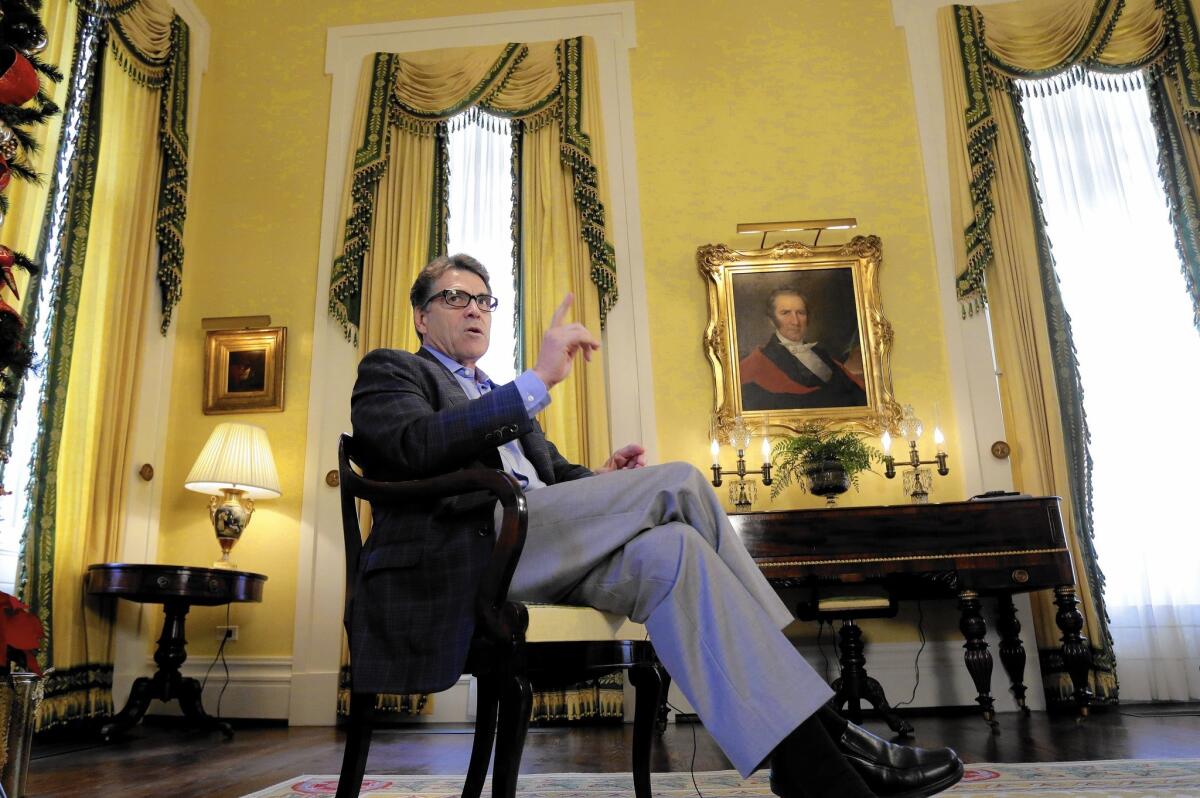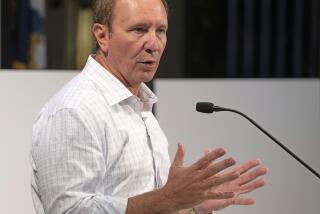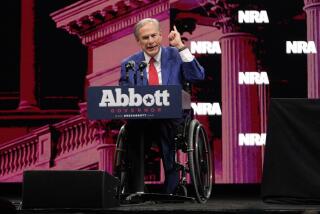Gov. Rick Perry, leaving office, ends an influential era in Texas

There is something every man and woman holding appointive office in Texas shares, whether sitting on the Supreme Court or serving on the Texas State Board of Plumbing Examiners. Each and every one of them — thousands in all — was put there by Gov. Rick Perry.
That is one reason his influence will linger for some time, even as Perry leaves office Tuesday after a record 14-plus years as Texas’ chief executive.
The combination of those ubiquitous appointments and Perry’s longevity helped transform the governor’s office from a weakling under the state Constitution to a political powerhouse, helping launch Perry on a second White House bid and offering his successor, fellow Republican Greg Abbott, a strong foundation on which to cement the state’s assertively conservative policies — not to mention the GOP’s political dominance for years to come.
Perry, a onetime Democrat who became governor when George W. Bush was elected president in 2000, did not create the Texas of small government, low taxes and sparing regulation. But he did more than any Texas governor in modern times — and maybe ever — to sell that model nationwide, staging raiding parties on California and other states and offering tens of millions of dollars in incentives to encourage businesses to relocate and do their hiring in Texas.
“There’s a reason more people move to Texas than any other state,” Perry said in his exuberant valedictory last week before the Legislature in Austin, a farewell that doubled as a preview of his presidential campaign stump speech. “Because this is the best place in the world to find a job and raise a family and pursue your dreams.”
As Perry likes to boast, nearly a third of the private-sector jobs created nationwide since January 2001 have been in the Lone Star State. “Our formula for success is simple,” he told a chamber packed with Republicans who run the House and Senate. “Keep taxes low, implement smart regulations, provide an educated workforce and stop lawsuit abuse at the courthouse.”
Perry’s had his share of missteps in his nearly decade and a half as governor — and not just his error-prone run for president in 2012. Perhaps the biggest mistake was a failed attempt to build a massive statewide transportation network, which stirred bipartisan opposition and pushback from environmentalists, property rights activists and the conspiracy-minded who considered the Trans-Texas Corridor part of a clandestine plot toward melding the U.S., Mexico and Canada into a single North American entity.
In recent years there has been persistent criticism that Perry abused his powers by rewarding cronies and lavishing state dollars on political benefactors. In August, the governor was indicted on two felony counts alleging he used his office to undercut the state’s ethics watchdog and thwart an investigation into one of Perry’s pet projects, the Cancer Prevention and Research Institute of Texas.
The governor vehemently denies wrongdoing and his attorneys have fought vigorously — and so far unsuccessfully — to have the case dismissed before going to trial.
Perry has still been blessed with good fortune throughout his 30 years in political life, not least during his time as governor, when the energy economy boomed; even if he didn’t put Texas’ abundant natural resources into the ground, he reaped considerable political benefit from their extraction.
“In Texas, dove hunters say shoot everything that flies, claim everything that falls,” said Wayne Slater, a longtime political writer and columnist for the Dallas Morning News, who recently retired after covering five Texas governors. “That’s what politicians do.”
The biggest difference between Perry and Abbott is personal style.
Perry is all chesty swagger, evoking the archetypal Texas cowboy. Abbott, the state attorney general and a former state Supreme Court justice, is a lawyer by training and a listener by inclination. Nonetheless, they share a conservative social and economic philosophy.
“Any changes policy-wise will probably be a matter of emphasis,” said James Henson, who heads the state politics project at the University of Texas in Austin. “And not even that much.”
Abbott will have to confront some of the problems stemming from the rapid growth encouraged by Perry, including traffic-choked highways, a stretched-thin water supply and public schools filled to bulging.
The price of oil has plunged, and with it a bulwark of the state’s economy. And looming just over Abbott’s shoulder is the state’s freshly elected lieutenant governor, Dan Patrick, a media-savvy favorite of the powerful “tea party” movement, whom some see as a possible primary challenger in 2018.
Perry, meantime, is headed to Iowa, which begins the presidential balloting in about 12 months.
Twitter: @markzbarabak
More to Read
Get the L.A. Times Politics newsletter
Deeply reported insights into legislation, politics and policy from Sacramento, Washington and beyond. In your inbox three times per week.
You may occasionally receive promotional content from the Los Angeles Times.











